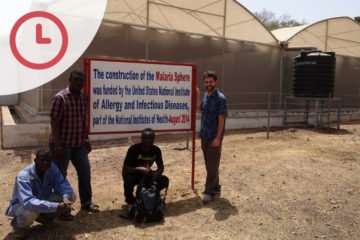Podcast Available on iTunes and Spotify.
Jake Baum is a Professor of Cell Biology and Infectious Diseases and has been thrust into the spotlight for what The Independent is calling a ‘major malaria breakthrough’.
Having analysed over 70,000 compounds, his team, based at Imperial College London, discovered a set of compounds which could prevent mosquitoes from spreading the disease. The focus, it seems, has been shifted to the prevention of transmission by looking at the infection of a mosquito.
I wanted to speak to Professor Jake Baum to learn more about his discovery and what this will mean for the future of malaria.
This is Five Minutes with Professor Jake Baum
There seems to have been a shift on the research agenda, hasn’t there, from focusing on how to improve to the diagnosis and treatment of malaria to focusing on preventing the transmission of malaria. Why is that?
When you think about how we can move to this lofty goal of eradicating malaria, we need to think about how malaria spreads and the dynamics of how it affects the individual, and the mosquito and how that individual mosquito goes onto infect others. And when you start thinking about it in those terms, you could block or suppress the process of a person infecting a mosquito then the impact on that can be very profound, even if the intervention is not very radical.
In The Independent, it said that you analysed some 70,000 compounds. Briefly talk us through the research and development stages, how on earth did you manage to screen so many compounds.
The overall goal of the lab was ‘can we find a way of screening for drugs that target the ability of a parasite to infect a mosquito, as a concept and how we would go about doing that. And then over several years, including work that I’ve done before I joined Imperial College in 2013, researchers in our group were able to miniaturize this process fooling parasites to think that they have left the human body and into the mosquito. You do that by simply dropping the temperature and adding a cocktail of reagents that mimic the environment that you find inside a mosquito’s stomach.
There target to eliminate malaria is 2040, and you say this is a long game of drug discovery, and it’s still very much ongoing, when do you think that R&D phase will stop and materialise into a drug that people can begin to take?
We do have several compounds that stop mosquitoes from being infected. Now we are working with chemists to try and realise those drug-like molecules becoming real things that could go into a pre-clinical trials. In terms of timeframe, like most things with malaria, it comes down to money in some ways. Whilst someone may have a drug that cures malaria, we are competing against that pot to try and say that we have a drug that doesn’t cure malaria but stops you giving malaria to a mosquito and so will stop it spreading. We will potentially in a few years, have a molecule which, providing it has the right safety and activity profile, would be able to enter a pre-clinical trial. Then you are in a gamble, does it actually work? A lot of drugs fail when they have beautiful pre-clinical and as soon as it goes into a person, they often do fail. So there is a lot of stages of attrition on the road, but that would mean that within five years, it would be great, it would be terrific if we could get one of our hits, or one of the hits from the broader screening that we are doing in the lab, into somebody and prove that it actually stops transmission, if that were the case then it is probably another five years of development to actually get it into something that could be administered. The timescale for any drug is 10-20 years but fortunately, we are part of a global effort, spearheaded by Medicines For Malaria Venture (MMV) to make sure that the pipeline for development is full with drugs at every stage of development. And if you look at the MMV literature, there are drugs that are reaching the pointy end of being able to go into clinical trials and potentially being licensed to use as well as those that are right at the very beginning of the discovery stage and we are somewhere in the middle, early middle.
You’re not alone on this project, you’ve got GSK and the Gates Foundation working with you, what are the benefits of working with other organisations?
When we were involved in a negotiation with the Gates Foundation, they helped bring us together with Dundee University, who have got expertise in bringing together a library of compounds and GSK, who are one of the leaders in translation, of actually making drugs and putting them in people
That was Five Minutes with Jake Baum


